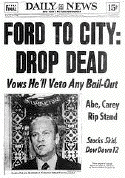Home > Archive > 2009 > May > 17
Neutrality in different contexts
Sunday, May 17, 2009 by Dave Winer.
 1. In our world we call it net neutrality. It means that all packets are treated equally on the Internet.
1. In our world we call it net neutrality. It means that all packets are treated equally on the Internet. ![]()
2. Among journos, it's the distinction betw editorial and publishing functions, what's often referred to as a Chinese Wall. ![]()
In the tech press, back when there was such a thing, they'd sometimes send an ad sales person to visit along with the editor in chief. The editor excuses himself to go to the bathroom, the sales guy says "If you buy an ad he'll review the product." Even if they don't come out and say it, it's often understood. It also becomes obvious to the readers that this is going on, so they stop believing the reviews. It's likely it happens in areas businesses, like movie reviews. ![]()
3. In government, it's the separation of church and state. This is one of the ways freedom of religion is guaranteed. If there was a state religion, one which was part of the government, people of different faiths, or ones who don't practice any religion, would have less rights. When someone says the US is a "Christian nation" they're saying they don't believe in this separation. ![]()
4. At Microsoft they claimed to keep the systems and apps divisions separate. This became a farce when they claimed that the web browser was part of the system software, when it was clearly an app. This is how they justified their plan to suck the web into Windows. ![]()
 5. You don't want your Internet Service Provider to also provide your cable TV because they might screw around with BitTorrent to keep you from getting your entertainment on the net, protecting their revenue from cable TV. So they make a promise to keep the two functions separate, and there's a scandal every time they fail to.
5. You don't want your Internet Service Provider to also provide your cable TV because they might screw around with BitTorrent to keep you from getting your entertainment on the net, protecting their revenue from cable TV. So they make a promise to keep the two functions separate, and there's a scandal every time they fail to. ![]()
6. With Google it means that the search engineers don't talk to the advertising people about fine-tuning their algorithms so the biggest customers get the best results. It's because we believe that Google doesn't screw around that we trust their search. ![]()
7. I feel very strongly that this kind of neutrality should be the rule on Twitter, and I also know that it's not the rule. They make no attempt to separate operational and editorial functions. In a way this is very honest of them, but it's also long-term going to be bad for business, as people they don't favor look for other outlets for their creative work. ![]()
8. Halliburton got some sweet deals from the Bush Administration because the VP was their CEO until he became VP. Did the VP ever explicitly tell DoD employees to favor Halliburton? He didn't have to, the theory goes, everyone knew where he came from. ![]()
This idea that you should keep certain functions separate from others permeates all human activities. It's so important we should have a theory for it, and a name that applies everywhere, so when a new thing comes along, no one need debate whether such separation is necessary or good. Unless somehow humans reinvented human nature, it's always both necessary and good. ![]()
This is something I hope to discuss with Jay in this evening's Rebooting The News podcast. ![]()
Recent stories
 Dave Winer, 54, pioneered the development of weblogs, syndication (RSS), podcasting, outlining, and web content management software; former contributing editor at Wired Magazine, research fellow at Harvard Law School, entrepreneur, and investor in web media companies. A native New Yorker, he received a Master's in Computer Science from the University of Wisconsin, a Bachelor's in Mathematics from Tulane University and currently lives in Berkeley, California.
Dave Winer, 54, pioneered the development of weblogs, syndication (RSS), podcasting, outlining, and web content management software; former contributing editor at Wired Magazine, research fellow at Harvard Law School, entrepreneur, and investor in web media companies. A native New Yorker, he received a Master's in Computer Science from the University of Wisconsin, a Bachelor's in Mathematics from Tulane University and currently lives in Berkeley, California.
"The protoblogger." - NY Times.
"The father of modern-day content distribution." - PC World.
One of BusinessWeek's 25 Most Influential People on the Web.
"Helped popularize blogging, podcasting and RSS." - Time.
"The father of blogging and RSS." - BBC.
"RSS was born in 1997 out of the confluence of Dave Winer's 'Really Simple Syndication' technology, used to push out blog updates, and Netscape's 'Rich Site Summary', which allowed users to create custom Netscape home pages with regularly updated data flows." - Tim O'Reilly.
Dave Winer
© Copyright 1994-2009 Dave Winer
Last update: 5/17/2009; 8:26:03 PM Pacific. "It's even worse than it appears."